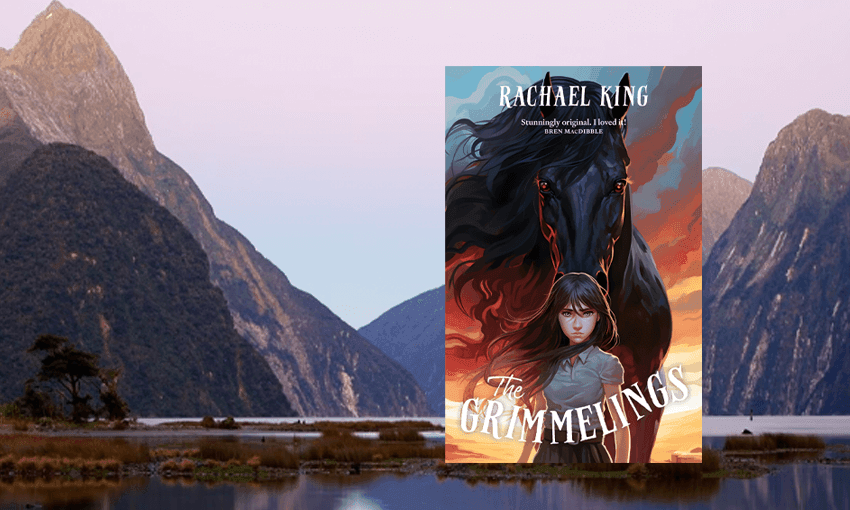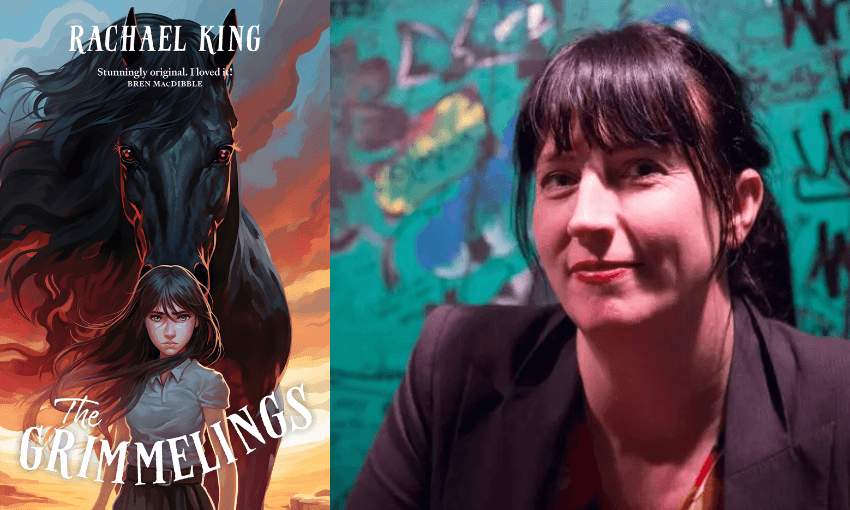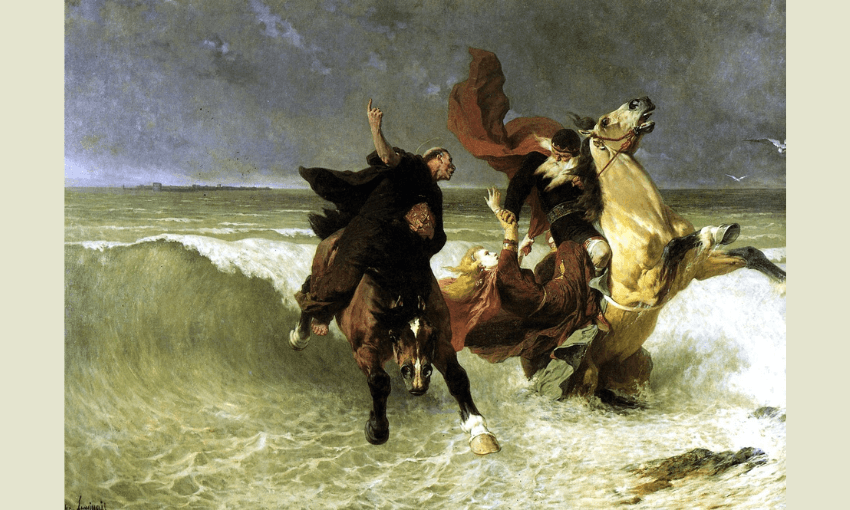Courtney Johnston reviews a novel of ‘deliciously judged suspense’ that will get you and your kids through the school holidays.
In an assured opening chapter, Rachael King opens up the world of her first novel in 12 years, the middle-grade fantasy adventure The Grimmelings:
“The same evening Josh Underhill went missing, the black horse appeared on the hill above the house.”
It’s a striking opening line, rhyming with Ronald Hugh Morrieson’s classic “The same week our fowls were stolen, Daphne Moran had her throat cut.” From these words of portent, King swiftly grounds us in the world of 13 year-old Ella, who we meet standing at twilight at her bedroom window. Below her, Ella can see her piebald pony Maggie grazing with the other horses in the home paddock. As the first stars appear, Ella contemplates making a wish:
“Nothing so big as asking for her father back, or for her gran, Grizzly, not to die. That was the same wish she made nearly every night when she glimpsed Venus in the sky. Something simpler.
A friend.
She’d like a friend for the school holidays, so she didn’t have to be alone.”
A flight of birds arrests her attention, and then her eye is drawnto the looming hills that overlook her family’s property, and the dark shape of an unfamiliar horse patrolling the boundary. A memory pops into her mind: her own voice saying “You’re cursed, Josh Underhill.”
Going downstairs, Ella hears her mother Morag pick up the phone: “Her voice was stiff. The locals never rang Morag for a chat, or for anything friendly, really.” It’s a woman, calling to ask if the family has seen Josh. Questioned by Morag, Ella and her younger sister Fiona exchange glances. They reveal a limited truth: yes, he was on the bus with them. What they don’t say is that Josh had been pushing Fiona around, and Ella confronted him: “Whatya gonna do?” Josh sneered. “Put a curse on me? Get your gran to do it? Or your mum? My dad says you’re a house of witches and you can’t pay your rent.”
So Ella did it. She pointed at the boy, and she said it: “You’re cursed, Josh Underhill. Better watch out!”. The memory rolls in her stomach as Morag hangs up the phone and tells the girls Josh has gone missing.
“And just like that, a shiver of darkness descended on the Basin.”
In four pages we’re neck-deep in King’s world. A girl. A lonely girl. A girl who loves horses. A girl, her sister, her mother, her dying grandmother, and the space where her father should be. A family of women viewed with suspicion. A wish. A curse. A mysterious horse that emanates power and unease.
You can spool out a bunch of potential treatments from this set-up. Perhaps this really is a household of witches, and Ella is about to get her beans for illegally practising magic on a school bully. Or this is a house of normies, but Ella has unleashed an inherited power, and the black horse will spirit her off to a school for magic where she will master her talent so as to avert disaster. Or perhaps Ella will unlock a telepathic bond with the strange horse, and together they’ll solve the mystery of the missing boy, then overcome the dark force that stole him away.
And that’s the difference between high fantasy (think portals between worlds, magical schools, dragons) and low fantasy, the controlled introduction of magical elements into a real world setting. The genius of The Grimmelings is how masterfully King balances a richly believable real life setting with a chilling interloping figure of folkloric magic.
Ella and her family live on their family horse-trekking business near a great lake, beneath the ranging hillsides known as the Ben; a location close to, if not exactly modelled on, the Mackenzie Basin. They are a close-knit foursome: sisters Ella and Fiona, their mother Morag, and Morag’s mother, terminally ill Grizzly (properly, Griselda, who came to the South Island from Scotland as a young woman). The family is partly defined by who’s not there: Grizzly’s husband and their father Will, who both went missing in or near the lake.
The family is not well-liked. They are tainted in the community’s eyes by the disappearance of their two men. Morag, lonely and burdened with business stress, is brusque and ill-at-ease with customers and local mums alike. Some time ago, Grizzly led a successful campaign to prevent the introduction of intensive dairying in the area: this did not endear her to the farming community. They are an independent and strong-minded group. “That’s what the women-folk in this family are like, hen, and there’s no getting away from it” Grizzly tells the girls. “We’re impulsive, rough, and rabble-rousers.”
The story is rooted in the life of the family and their horse-trekking business, in a way that is unusual for books written for this age group. We become familiar with the rhythms of the guided treks, with Morag’s dislike for customers who she can’t trust around her beloved horses. We’re even inducted into the health and safety practices of an outdoor adventure operation. It’s a novel twist on the horse breeding / racing / jumping / ranching genre with all the appeal of a horsey book (plenty of delicious details about horses’ gaits, coats and personalities), deepened by incorporating Ella’s awareness of day-to-day struggles of their family business.
The novel is also true to the experience of grief. In one passage, Ella muses on how people “talked about how sad it was that Ella and Fiona had lost their father. Lost. As in misplaced. How could you misplace something as big as a father? … Saying they had lost him made it sound as though it was their fault.”
For Morag (the most believable adult character I’ve read in a middle-grade book in a long time) it is possibly even worse: the local gossips foment the notion she and Grizzly (witches) ridded themselves of their inconvenient menfolk, or perhaps have driven them away, while eavesdropping Ella has overheard Morag’s racking guilt about the evening Will went fishing and didn’t come back. In the way of real life, sadness doesn’t mete itself out in manageably timed doses: there is a humming line through the novel of Grizzly’s physical decline, and acceptance of her coming death. It’s a lot of realism for one family to be carrying, and it is depicted with compassionate clarity.
Once we’re established in Ella’s world, King deftly gives rein to her fantastical elements. On the evening Josh goes missing, and the menacing horse appears, the community comes together to search for the boy, and Ella meets a stranger:
“Now, hovering nearby, a boy about her own age caught her attention. She’d never seen him before; he didn’t go to her school. Perhaps he was older than he looked. He wore a jacket and pants that were too big for him, and a beanie pulled down over his ears, with tufts of unruly black hair poking out. He had that look of teenage boys who have grown too quickly – all mouth and nose and thick black eyebrows in a long narrow face. He caught her gaze and held it, until she looked away, embarrassed.”
Gus insinuates himself into Ella’s life and, longing for friendship, she chooses to look past his puzzling behaviour and unsettling intensity. It’s Gus who gives Ella the language to name the black horse, when he raises the figure of the kelpie, the Scottish water horse, a beautiful and deadly mythological creature known for enticing children to mount it and then galloping them under the surface of lakes and rivers to devour them. It’s Gus who puts into her mind the idea of a thinness between worlds, “a veil … between order and calamity”.
As Ella’s push-pull attraction to the strange horse and strange boy grows, a supernatural space expands in both the environment and the characters, vibrating into the weather and mood of the lake, and manifesting in strange phenomena like a dream shared one night by all the family. Ella and her family have to come to grips with a threat that does not make sense in their world.
The Grimmelings could easily have a traditional story arc where a young hero overcomes an evil foe. Instead, the novel reveals itself not as a battle drawn between Ella and the kelpie, a story that has been started back in Scotland and must play out to its end. In making this choice, King draws some inspiration from Alan Garner’s The Owl Service, which she re-read while working on The Grimmelings and credits with opening up a new approach within the novel. In Garner’s book, three modern day teenagers in rural Wales find themselves unwittingly re-enacting a Welsh myth of an enchanted woman caught between two men, the latest instance of centuries of attempts to confine or fulfil the ancient story. In The Grimmelings a supernatural Scottish creature, and a previously hidden piece of family history, are imported into the South Island landscape.
The resetting of folklore and mythology are popular tropes in both children’s and adult literature. A reader’s mind thrills to find familiar story shapes and characters deployed in surprising ways. King’s previous middle grade novel, Red Rocks, introduced the shapeshifting Celtic selkie to Wellington’s rocky southern coast, and her fascination with Celtic mythology is clear. So is her acknowledgement of her decision to introduce these foreign beings to the Aotearoa landscape, and the wider history and practice of colonisation that this evokes. Seeded throughout The Grimmelings are passages that say to the adult reader Yes, I know what I am doing here. For younger readers, a narrative thread about – to pick just one example – rowan trees (Grizzly brought a rowan plant with her from Scotland, a comfort from home: in Te Wai Pounamu to thrives too well, and becomes an invasive pest) may well lodge in their minds in such a way that they are recalled and will expand as they go on to learn more of Aotearoa’s history.
This theme of imported culture is also explored in one of the most appealing aspects of the book. In addition to being a horsey book, an adventure book, a fantasy book and a family book, The Grimmelings is a book about the power and beauty of language. Chapters open with a little snippet of dictionary definition drawn from Grizzly’s “word book”, a battered notebook full of treasured terms:
“Grizzly was a self-described word-hoard. She collected words like other people collected old coins or pottery owls. Most of them described nature, and most were from Scotland, but she collected other words that took her fancy as well. She said that words native to her new home helped bind her to the place.”
These words are a special connection Grizzly shares with Ella, who in turn seeks to use the words to describe the environment and people around her. Reading these passages I relived the delight I felt as a child building up my own word hoard, learning new words and their specific shapes and jobs. The girls chant a list of names for icicles that Grizzly teaches them: ickle, shuckle, clinkerbell, daggler, tankle, shackle, aquabob, snipe. Grizzly teaches Ella the names for different kinds of wind:
“A stour wind was the wind of driving storm that brought with it pelting rain and black, smouldering cloud. On an otherwise still day, a whiffle was nothing more than the light breath you feel on your cheek before a kiss. The Nor’wester scudded in great gasping gusts, gurling and huffling; it could knock you off your feet.”
“You can use words to describe anything,” says Ella early in the book. “Can’t you?” Naming is power, and words matter: wishes, curses, gossip. The power of the kelpie, a beyond-reality being, tests this:
“If there is no word for something, is it real? If you can’t name something, does it exist? This horse was outside language, it was outside this time and place; she knew it in her bones. It was of the earth but not of this place.”
The Grimmelings succeeds as a fantasy adventure story, with convincing magic and deliciously judged suspense. Beyond this though, it is a book to savour for its storytelling craft, its detailed depiction of family life, and the way it will feed young readers’ ravenous minds with words and ideas.
The Grimmelings by Rachael King (Allen & Unwin, $25) is available from Unity Books Wellington and Auckland.























Discussion about this post